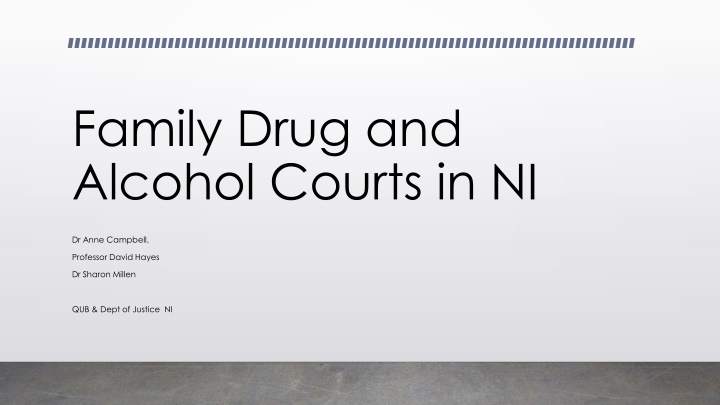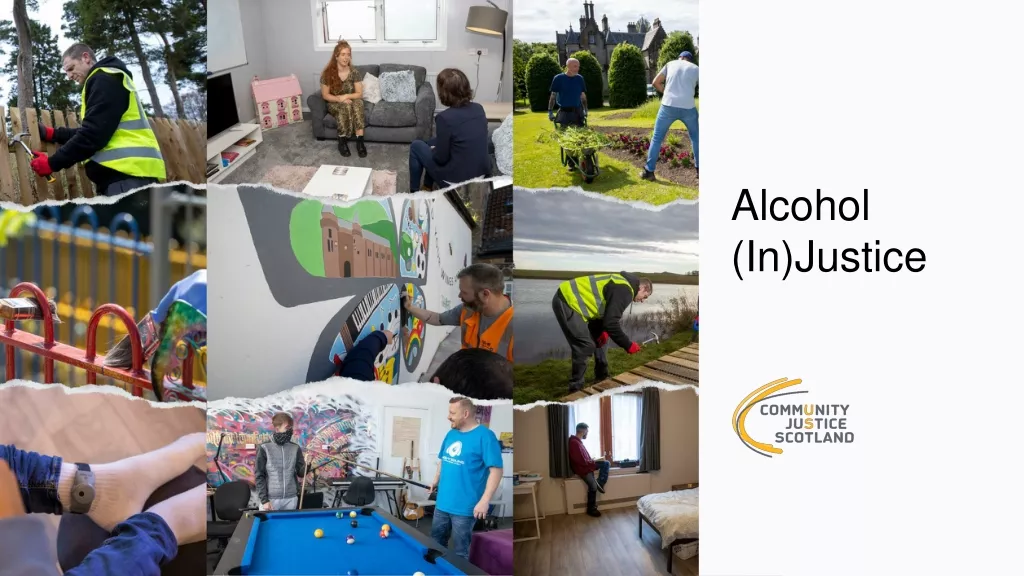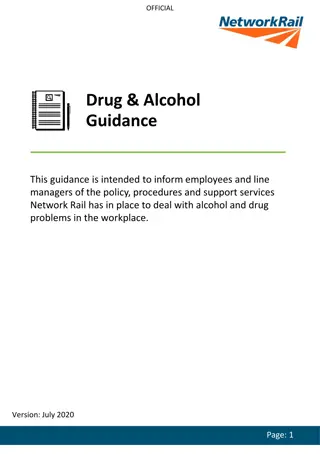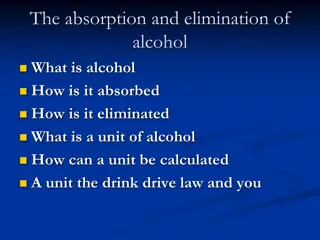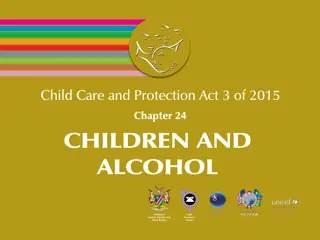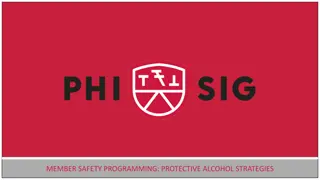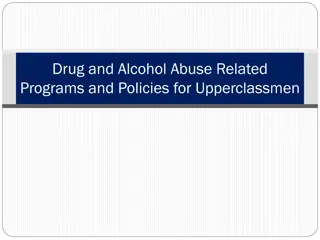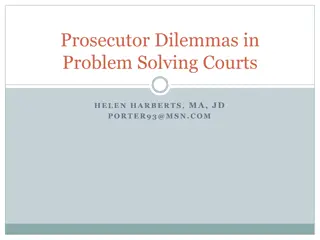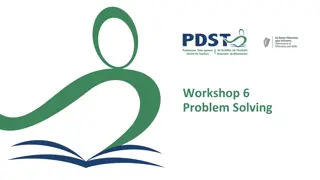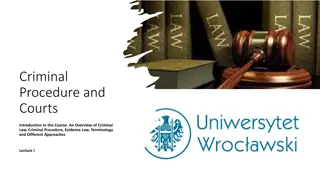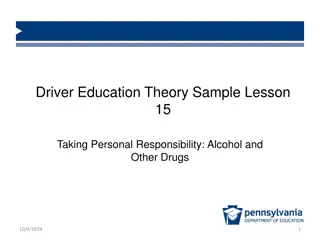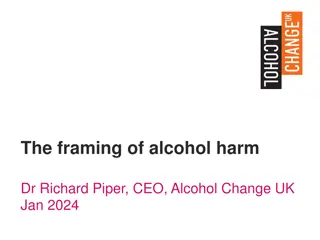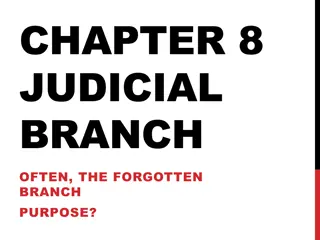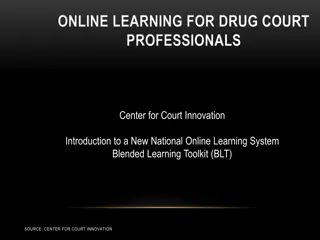Family Drug and Alcohol Courts in NI: A Problem-Solving Approach
Contextualizing the establishment of Family Drug and Alcohol Courts (FDACs) as an alternative approach in care proceedings involving parental substance use. The adaptation of the FDAC model from the USA to the UK, specifically in England and Wales, highlights the key features focused on addressing the underlying issues of substance misuse disorders. The positive outcomes of the UK FDAC pilot in London from 2008 to 2012, as independently evaluated, demonstrate higher success rates in helping parents cease substance use and reuniting children with their families compared to standard care proceedings. The cost-benefit analysis also supports the effectiveness and efficiency of the FDAC approach, suggesting its potential for wider implementation across relevant social and justice systems.
Download Presentation

Please find below an Image/Link to download the presentation.
The content on the website is provided AS IS for your information and personal use only. It may not be sold, licensed, or shared on other websites without obtaining consent from the author.If you encounter any issues during the download, it is possible that the publisher has removed the file from their server.
You are allowed to download the files provided on this website for personal or commercial use, subject to the condition that they are used lawfully. All files are the property of their respective owners.
The content on the website is provided AS IS for your information and personal use only. It may not be sold, licensed, or shared on other websites without obtaining consent from the author.
E N D
Presentation Transcript
Family Drug and Alcohol Courts in NI Dr Anne Campbell, Professor David Hayes Dr Sharon Millen QUB & Dept of Justice NI
Context FDACs provide an alternative, problem-solving approach to care proceedings in cases where problematic parental substance use is a key factor in initiating proceedings and there is no indication of severe sexual or physical abuse. The first FDAC began in London in 2008. The precipitating factors for setting up FDACs were concerns in the family justice and child welfare systems about the proportion of care proceedings involving parental substance use and the number of cases where parents with such problems had other children removed in subsequent care proceedings (Harwin & Ryan, 2007).
Context ctd. The FDAC approach and process was an adaptation of the Family Drug Treatment Courts (FDTCs) used for cases of parental substance misuse in the USA. FDTCs take a problem-solving approach first developed in the criminal justice setting and considered the court as having a role to play in addressing the revolving door syndrome of repeat offending (Bowen & Whitehead, 2016). The model was adapted to fit the English and Welsh legal and welfare systems but key elements of problem-solving court were retained. These key features are:
Context ctd specially trained judges who deal with the case throughout and are actively engaged in motivating and challenging parents through regular meetings held during the proceedings, support for parents and for the court from a specialist multi-disciplinary team, who provide expert skills and knowledge and co-ordinate wider services for the parents, focus on helping parents address and solve the problems that underlie their substance use problems / disorders .
Context ctd A UK FDAC pilot ran in London from 2008 until 2012 and was independently evaluated. The evaluation compared outcomes of FDAC cases with similar cases in standard care proceedings in the same court from different local authorities. Findings were positive, showing that at the end of proceedings parents in FDAC were more likely to cease using substances than parents in standard proceedings, and that children in FDAC cases were more likely to return home than children in standard proceedings. The evaluation also found FDAC was positively viewed by professionals social workers, lawyers, guardians, adult treatment service providers, and judges as well as by parents. A small costs study indicated that FDAC was less expensive than standard care proceedings and likely to produce cost benefits for health, police and justice services in the longer term (Harwin et al., 2014). The researchers observed that it would be fairer if the cost of the specialist team (the main cost of FDAC) was spread across local authority Children s Services, health and justice agencies
Review Zhang, S., Huang, H., Wu, Q., Li, Y., & Liu, M. (2019). The impacts of family treatment drug court on child welfare core outcomes: A meta-analysis. Child abuse & neglect, 88, 1-14. Two primary outcomes of the research Outcome one - Family reunification Overall, Family Drug and Alcohol Courts tended to show a positive effect on family reunification, compared with usual services This is based on high strength evidence from 16 research studies and a total number of 7,085 participants. Outcome Two - Care re-entry and re-abuse Overall, Family Drug and Alcohol Courts had no effect on care re-entry. This is based on high strength evidence from 8 research studies with a total number of 1,474 participants.
FDAC Evaluation NI (Qualitative Phase) The FDAC is one of 5 problem solving justice initiatives. The overarching objective of the pilot programme was to establish whether a problem solving approach to care proceedings can lead to better outcomes for families in terms of levels of substance misuse and children remaining in the family. Pilot based in Newry Family Proceedings Court and the Southern Health and Social Care Trust.
Research Objectives Ascertain the views of participants and workers on the problem solving approach to care proceedings (where applicable with reference to experience of traditional proceedings) including process and the role of the Judge. Seek the views of participants and workers on the intervention and treatment process and the impact of the model. Ascertain the views of participants and workers on the impact of the problem solving approach on outcomes including participant well-being and the well- being of their children at the end of proceedings (to include levels of substance use and other difficulties experienced by the family e.g. health problems, parenting skills, familial relationships, self-efficacy, DV etc.). Consider the views of participants on possible refinements or improvements to the model, including identification of potential triggers for disengagement.
Methodology All FDAC participants subject to a treatment plan were invited to take part in the study, using a purposive sample technique (Sarantakos 2010). The parents of five families accessing the service were recruited to the study (n=7). The FDAC Judge, FDAC Team (n=5), solicitors (n=3) and guardian ad litems (n=3) involved in the process also provided their views through individual interviews and 1 focus group. The FDAC team comprised of a consultant psychiatrist from adult community addictions, three senior social work practitioners one from a childcare and family background, one from addictions and the implementation lead (whose background was also childcare and family). There was also a mental health nurse (part-time). Total sample size = n=19
Key Summary points from Service User Interviews (Findings to be published in May 2022) As part of the assessment process, the team talked with each parent about what was involved and what would be expected of them during the 26-week duration of the process. Parents were informed that the process was intensive but would assist them help to stop / reduce using alcohol/ substances. It would require hard work and commitment. If they continued to use substances throughout the duration of the process however, they would be removed from the programme. Those interviewed felt that they fully understood the process and what was expected of them.
Service user views Fully understood the process 100%.. I understood I was getting all the support under one roof and it was going to be for me and my kids. It wasn t just treating me on my own, I knew it was going to be intense but because it was intense I was more focused and that if you were willing to put the work in you ll get the support along the way to help you.. hopefully the end goal was then getting your kids back, so I knew what I had to do.
Motivating Factors The main motivating factor for parents taking part in FDAC was the possibility of the return of their child within a quicker time frame (compared to traditional family court proceedings). Other reasons included - the offer of a fresh start, help and support for the adult as well as the children, a strong desire for a change in circumstances, the opportunity to talk to the team to try and identify the root cause of problems, the fact that the process seemed to be much more transparent and inclusive (compared to traditional proceedings) and a lack of understanding of traditional process.
Initial Perceptions At the beginning of the process the majority of participants reported feeling fearful of saying the wrong thing to the FDAC team and to the judge. They were cautious of over sharing and making their situation worse due to the significant consequence of losing their child. The prospect of meeting the judge to discuss their circumstances and progress felt weird and scary at first. Others reported feeling angry and frustrated at themselves for allowing things to progress to the stage of court proceedings.
Initial Perceptions ctd. Angry, but at myself, because if I had of went and asked for the help beforehand it probably wouldn t have ended up the way it did with the child being removed. At the start oh god I remember the first couple of weeks going in and that was before rehab and everything and I would have been sweating and shaking you know cause just the thought of having to sit across the table from him (the judge)
Perspectives on the Judge Overall, very positive feelings towards the Judge.. The prevailing initial shock that we was so down to earth and interested in what they had to say . If I had a problem with something I can just raise it and say like this is what I think. Do you know.it was like a two-way thing? It wasn t a case of you just sit down and do what you re told, do you know the judge encourages you to ask questions and to tell him how you re feeling and what you think, rather than just sit there . Felt I could be honest with him Because he was being honest with me. Like that was the whole point of the whole thing.
Comparison between traditional Court P Proceedings & FDAC Those who had previous involvement with family court proceedings described the process as traditional process as complex and unclear. All respondents agreed that the FDAC process was a much better way of working as they were involved throughout and had the opportunity to contribute to discussions regarding their own personal circumstances. This was considered to be a huge step forward. Another advantage of FDAC was the opportunity to get a decision from the courts in a much shorter time frame i.e. 26 weeks as opposed to up two years. In addition, the fact that parents were offered intensive wrap around therapeutic support and practical help with their addictive behaviours and other problems was considered hugely beneficial:
Traditional Court System FDAC In this in the FDAC you re told about everything and you know everything that s happening, everything that s going on, you know you re involved in everything which made it a lot better as well so then cause like I know the way I would have thought maybe about social workers and everything before ..where that s completely different to the way I think about them now . It was the thing.. sitting outside, didn t know what was being said about me, had no idea what was going on, right, they just came out and told me, it s just been adjourned or whatever do you know what I mean .
Theyre standing waiting on you. They are waiting on you till relapse to fall, grab you and put you back again. Like most meetings that I went to they said look it is ok. It is ok if you took a drink. It is ok if you relapse just as long as we get you sorted and get you back on to the track again.
. I started in February and I had my children back in July, do you know and if I was going through the court thing you would be talking years and you know contact maybe a couple of hours a week, so the relationship with your kids would be fractured and also you would have no motivation to stop drinking, you know what I mean, because you d nothing to focus on just hopelessness you ve no idea. I ve got a better relationship now with my children.. like I now spend quality time with my children.. I can just see it in them, I am able to talk to them, play with them, where beforehand that relationship wasn t there I was a parent, I was a mother, whereas now I feel as if I m a full-time mummy now.. I ve got time for them where beforehand they were like an inconvenience sort of, you know I loved them but with the drinking . and all, they were just another thing I had to deal with. whereas now they re my focus .
References Zhang et al (2019) The impacts of family treatment drug court on child welfare core outcomes: A meta-analysis ScienceDirect A mixed methods evaluation of the NI FDAC pilot Programme QUB & DOJ ( in press)
